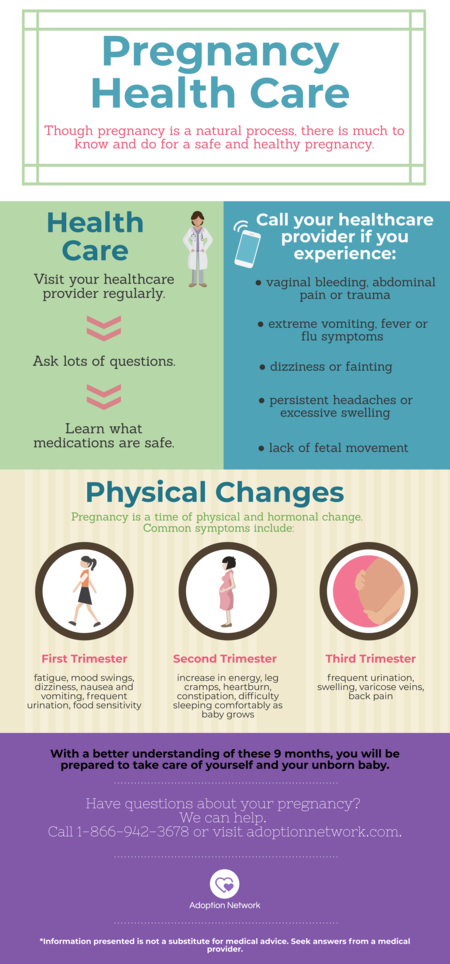
Pregnancy Lifestyle Changes
Your baby starts to develop from the moment sperm fertilizes the egg and continues until delivery. A typical pregnancy is full-term at 40 weeks. Though pregnancy is a natural process, there is much to know and do to ensure a safe and healthy pregnancy.
HEALTH CARE
At the start of your pregnancy you will visit your healthcare provider about once a month.
Your first prenatal visit will usually be about 8 weeks after your last missed period. This is generally your longest visit since your doctor or midwife will be gathering all the information needed to help you and baby stay healthy throughout the duration of the pregnancy. Be prepared to answer questions such as when your last period started, your previous pregnancies if there are any, issues your mother had during pregnancy and other family history, allergies, your diet, past surgeries, your work and lifestyle environment, and risk of sexually transmitted diseases. A physical exam will also be done including weight, height, and pelvic exam. Some providers may press on your stomach to feel for the uterus size and shape, while others may conduct an internal exam and a pap smear.
If you have an appointment in the early weeks, you may have an internal ultrasound to determine a more accurate due date based on the baby’s growth from crown to rump, rule out an ectopic pregnancy, or determine multiples. Early ultrasounds look a little different than ones you may be used to seeing later on in pregnancy with a fully formed and larger baby. In these early weeks, typically you see a fetal pole that the technician will measure for size, a circular yolk sack that resembles a balloon near the baby, and a larger circle surrounding everything which is the gestational sack containing amniotic fluid inside. If you don’t have an ultrasound, they will determine your due date based on your last missed period (LMP) alone.
Around month 6 you will schedule appointments every 2-3 weeks, and in the last month of pregnancy you will be seen once a week until delivery.
Questions to ask your medical provider:
- What medications are safe?
- Who do I call in an emergency?
- What tests can I expect at each appointment? (blood, glucose, urine, ultrasound)
- Labor and delivery questions: when to go to the hospital, type of delivery, complications
When should I call my medical provider?
- Vaginal bleeding beyond spotting in the first trimester
- Intense abdominal pain
- Extreme vomiting to the point of dehydration
- Persistent severe headaches
- Excessive swelling
- Trauma to the abdomen
- You don’t feel the baby moving
- You have a fever or flu symptoms
- Dizziness or fainting
- Depression or anxiety
PHYSICAL CHANGES
Pregnancy is divided up into 3 time periods or trimesters about 3 months each. Here’s what you can expect during each trimester:
First Trimester
Pregnancy triggers all kinds of physical and hormonal changes in your body. During your first trimester, you won’t see many noticeable differences but you might feel some of them:
- Fatigue
- Mood swings
- Dizziness
- Nausea and vomiting
- Bothered by certain foods and odors
- Frequent urination
- Stretch marks
Second Trimester
For many women, this is their favorite trimester of pregnancy. Morning sickness has usually subsided, and you might experience:
- Fluttering sensation as your baby moves
- Increase in energy
- Leg cramps
- Heartburn
- Constipation
- Difficulty sleeping in your usual position
Third Trimester
You’re almost there! The baby will move quite a bit at the beginning of this trimester with movement slowing down as delivery gets closer and there is less “wiggle” room. Some symptoms of the second trimester carry over into the third trimester:
- Frequent urination
- Swelling
- Varicose veins
- Back pain
- Insomnia
- Heartburn
With a better understanding of these 9 months, you will be prepared to take care of yourself and your unborn baby.
* This information is not a substitute for medical advice. Seek answers from a medical provider.
DOWNLOAD the full “Pregnancy & Adoption Planning Guide” here
Available 24/7 to Answer Your Adoption Questions


Search Adoption Network
Speak with a Specialist 1-800-367-2367

